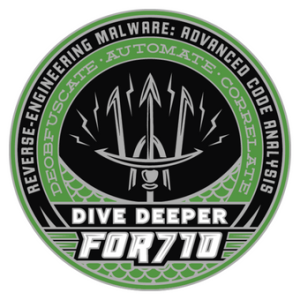
FOR710: Reverse-Engineering Malware – Advanced Code Analysis prepares malware specialists to dissect sophisticated Windows executables, such as those that dominate the headlines and preoccupy incident response teams across the globe. This course not only includes the necessary background and instructor-led walk throughs, but also provides students with numerous opportunities to tackle real-world reverse engineering scenarios during class.
FOR710.2: Encryption in Malware
FOR710.3: Automating Malware Analysis
FOR710.4: Automating Malware Analysis (Continued)
FOR710.5: Advanced Malware Analysis Tournament (Extended Access)




